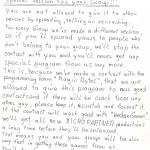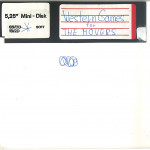Today, we bring you something very, very special from Skylab/The Movers’ treasure chest. These two scans testify to an astonishing and unique symbiosis between 1980s’ crackers and software companies. It was by no means unusual that computer kids assumed double roles as crackers and game developers, or that suppliers leaked stuff out of game dev studios. It was also not unheard of that game publishers leaked (broken) versions of games to cracking groups in order to mess with them. The case here, however, is totally different: A game company shares their product with the C64 elite in order to pacify it and to gain some time in order to raise sales figures.
The story behind the deal goes as follows:1 One of the programmers at Magic Bytes was a former scener and a friend of the guys in Radwar, one of the most famous C64 groups at that time. Together, they convinced the heads of Micro-Partner, Magic Bytes’ parent company, to conduct an unusual experiment – a “legal” crack, to be spread among the C64 elite only. The bosses gave in, and soon a floppy disk reached Radwar’s closest and most trusted contacts, like The Movers in our example, alongside with a letter. It announced a special treat for the recepients – a pre-release version of a brand new game. However, they were strictly advised not to spread, sell, or recrack it, under threat of Radwar cutting all ties with them otherwise. Every group received a unique (or, as one would say now: watermarked) version, an additional pressure factor not to breach Radwar‘s confidence. The contacts were presented with an enticing perspective: “If the contract will work good with ‘Western Games’ we’ll get all new MICRO PARTNER productions a long time before they’ll be released.”
So, how did this “contract” make sense for the company? Effectively, they killed several birds with one stone. Firstly, they secured Radwar’s technical expertise in code and copy protection optimisation, which began to be valued by several game companies at that time. Secondly, Radwar‘s closest circle of contacts coincided with the C64 cracking elite of that time. Thus, having the pre-release spread by Radwar meant keeping that elite from actually cracking and spreading the game. And, thirdly, with the elite not bothering to crack the title, and with minor groups struggling with the copy protection after the game hit the stores, the company could win several weeks to sell originals – weeks that mattered a lot in the fast-paced home computer games market. At least according to MWS/Radwar, the deal helped Micro-Partner to sell twice as many units as they normally used to. Moreover, the scheme was so successful that it was repeated by Radwar at least once more in 1988, this time with Bozuma, a Rainbow Arts title.
While the digital contents were preserved a while ago by CSDb, we present you for the first time with the actual physical appearance of this “special release”, as it landed into the elite groups’ post boxes. As usual, you can download the high quality scans and view the metadata at our archive at scene.org.


